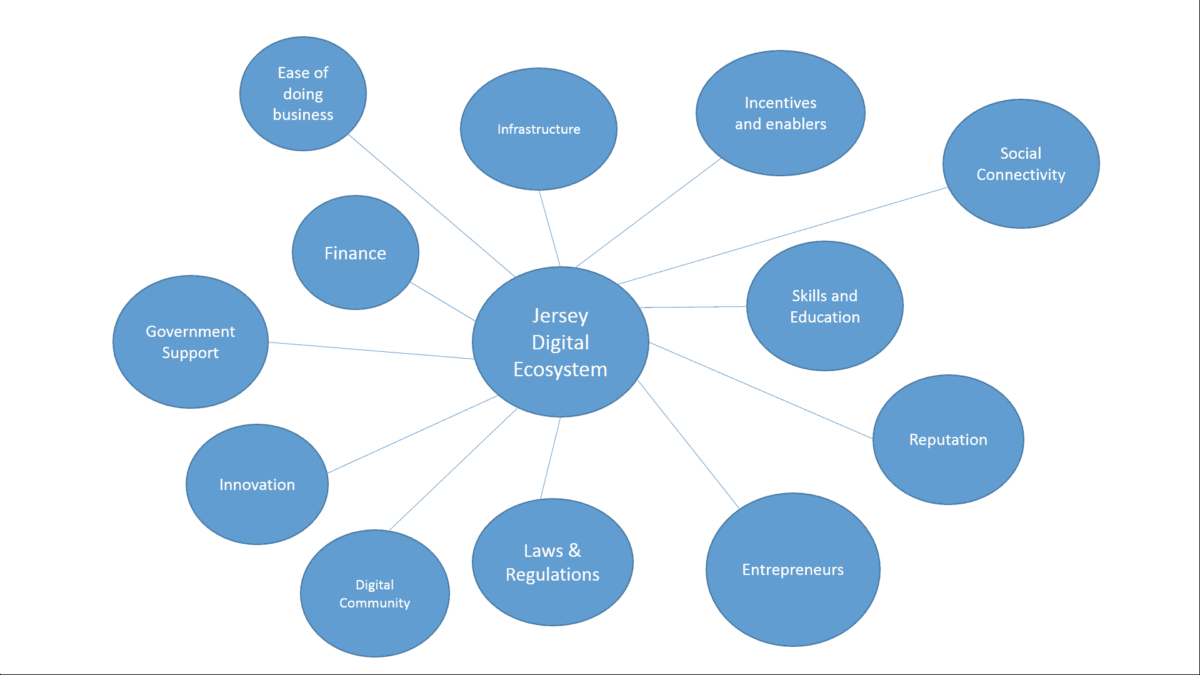
As recently published in 20/20 Magazine.
Working for 5 years at the Durrell Wildlife Conservation Trust taught me the importance of healthy ecosystems. In the natural world ecosystems are complex and massively interdependent, requiring multiple elements working together in harmony to ensure that the entire system is heathy and sustainable to life. Conversely, while everything must work together, it often only takes the absence or loss of one element to harm all. Sadly there are too many examples of this in the wild; the Brazilian rain forest easily comes to mind, but this is equally true for smaller, less complex, equally delicate ecosystems, such as the one that sustains Jersey’s agile frog.
A healthy digital ecosystem in Jersey has many of the same considerations, and challenges, that are found in the natural world. Creating the right set of conditions for business and communities to thrive in the digital age is critical to Jersey’s future and is an essential part of Digital Jersey’s work. Starting early in 2013, the purpose of Digital Jersey is to act as an accelerator – to create growth in the digital sector, (by supporting technology companies and also the use of technology broadly in all companies), and to enable the use of technology for society in general.

To support this objective, Digital Jersey has set longer-term targets for growth in GVA of the digital sector and for job creation, aiming to deliver 2,300 new jobs by 2020. In addition to economic targets, Digital Jersey has social objectives for education and skills development and the roll out of eGovernment capabilities for improved services to Jersey residents. Finally Digital Jersey is also focussed on establishing Jersey’s reputation as a progressive ‘digital’ jurisdiction.
To make this happen, Jersey needs a strong digital ecosystem. We are a late entrant to the digital race – Malta by comparison launched their digital strategy in the early 1990’s – and in order to develop in the right way, we now need to consider how we compare to others and what we can learn from them.

Ecosystems are complex structures. This is just as true for Jersey’s digital environment but we can look at the major building blocks as shown below:
Complementing the island’s existing advantages (its legal and regulatory framework, financial and tax structures, quality of life and living standards) Jersey is making progress in many of these areas. The launch this year of the Digital Jersey Hub is an excellent example; contributing to the island’s digital infrastructure, creating a centre and focus for Jersey’s digital activities and building a community. Now home for over 80 individual and business residents, the Hub provides co-working space for start-ups and a growing range of incubator services, training and development programmes, workshops and meet-ups. The availability of technology skills in Jersey remains a pressing problem and there is a significant gap, both in terms of capability and capacity, to support growth in the digital sector. In the immediate term this gap is being met through inward migration, a controversial subject in a small island that wants to balance economic growth with a sustainable environment. Beyond this, the island is providing increased training programmes, including Digital Jersey’s own Coding Programme that graduates its first cohort in February next year. The 14 students come from a variety of backgrounds, few with existing technology skills, with age ranges from 19 to 43.

With good progress being made in many areas, Jersey’s digital ecosystem still has a long way to go; as with Rome, it will not be built in a day. Our international reputation in the digital arena remains small – conferences such as this year’s Island Innovators have helped, when more than 120 participants from over 20 countries brought their knowledge, skills and relationships to Jersey for the first time. Additionally, while there are moves to improve the level of technology covered in the school curriculum, Jersey does not have a university, certainly not comparable to the institutions that play such a vital role in most tech centres, driving innovation and supplying new talent and business ideas.
As in all jurisdictions, the role of government is vital to Jersey’s digital future. It is critical that government ensures that it is easy to do business here, by minimising red tape and bureaucracy, provides much needed incentives to support growth and attract businesses and, most importantly of all, to deliver a vision for a digitally enabled island. In many of these areas Jersey is becoming less competitive – not because we are slipping backwards but because other countries are moving forward at speed. For example our traditional tax advantages are no longer as compelling, with other countries matching them and adding highly attractive direct incentives to attract companies to their shores. Similarly, visiting Estonia earlier this year demonstrated why that small country tops the league in the eGov stakes as they now provide more that 3000 services to citizens online, including the ability to register a new company in less than 20 minutes, a process that can take days or weeks in Jersey. The Estonian government estimates that the impact of these digital services has been to save each citizen two weeks per year in administration time. Multiplying that by per capita GDP offers an impressive estimate of the economic impact of well-delivered eGov. In addition to the citizen benefits, Estonia’s eGovernment initiative provided a huge stimulus for their technology and digital sector and for overall growth in the economy. Many readers will be familiar with Skype – this is an Estonian company, grown from the digital initiative there.
Jersey remains way behind in this arena and while residents in Tallinn park their cars using GPS enabled ‘cashless’ systems on their mobile phones, in St Helier we continue to scratch away on our iconic parking cards!
Finally, Jersey’s greatest challenge may stem from the very success that the island has created and enjoyed. While there is certainly creativity and entrepreneurship in the island there is not the same level of drive and economic need that is seen elsewhere. This is also changing – as the traditional routes to success in Jersey, such as the financial sector, become less certain and far more difficult and challenging.
While Jersey’s digital ecosystem is a ‘work in progress’ the island is already seeing growth in the digital sector; new jobs are being created in existing companies while new companies are being attracted through inward investment, with the pipeline of new developments growing. But we must recognise that we are in a race with many other countries, regions and cities that are all running down similar digital paths. The question to ask is ‘are we running quickly enough?’ In a world where we all constantly wonder at the fast nature of change, it is sobering to think that the speed of change will never again be as slow as it is today.
There seems little doubt that, as promising as Jersey’s progress has been, we need to pick up the pace. Key to this is ensuring that the building blocks and foundations are in place to support our digital development, both economically and socially. This is what creating a digital ecosystem all is about.



